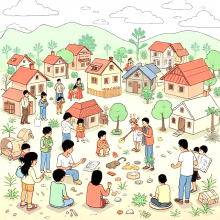Lessons on Preserving Bilingual Identity
The “Seinn Lann Myaing” Family moved to the United States in 2001. At that time, they faced an important decision that would affect not only their own lives but also the lives of their children. Like many immigrant families who arrive in a new country, they wanted to integrate quickly into society. They thought the best way to do this was by adopting the language of their new home. Therefore, they made a deliberate choice: they would stop speaking their native language, Myanmarsar (Burmese), at home and would communicate only in English. Their reasoning was simple. Since they were now living in an English-speaking country, they believed that English should completely replace their mother tongue.





